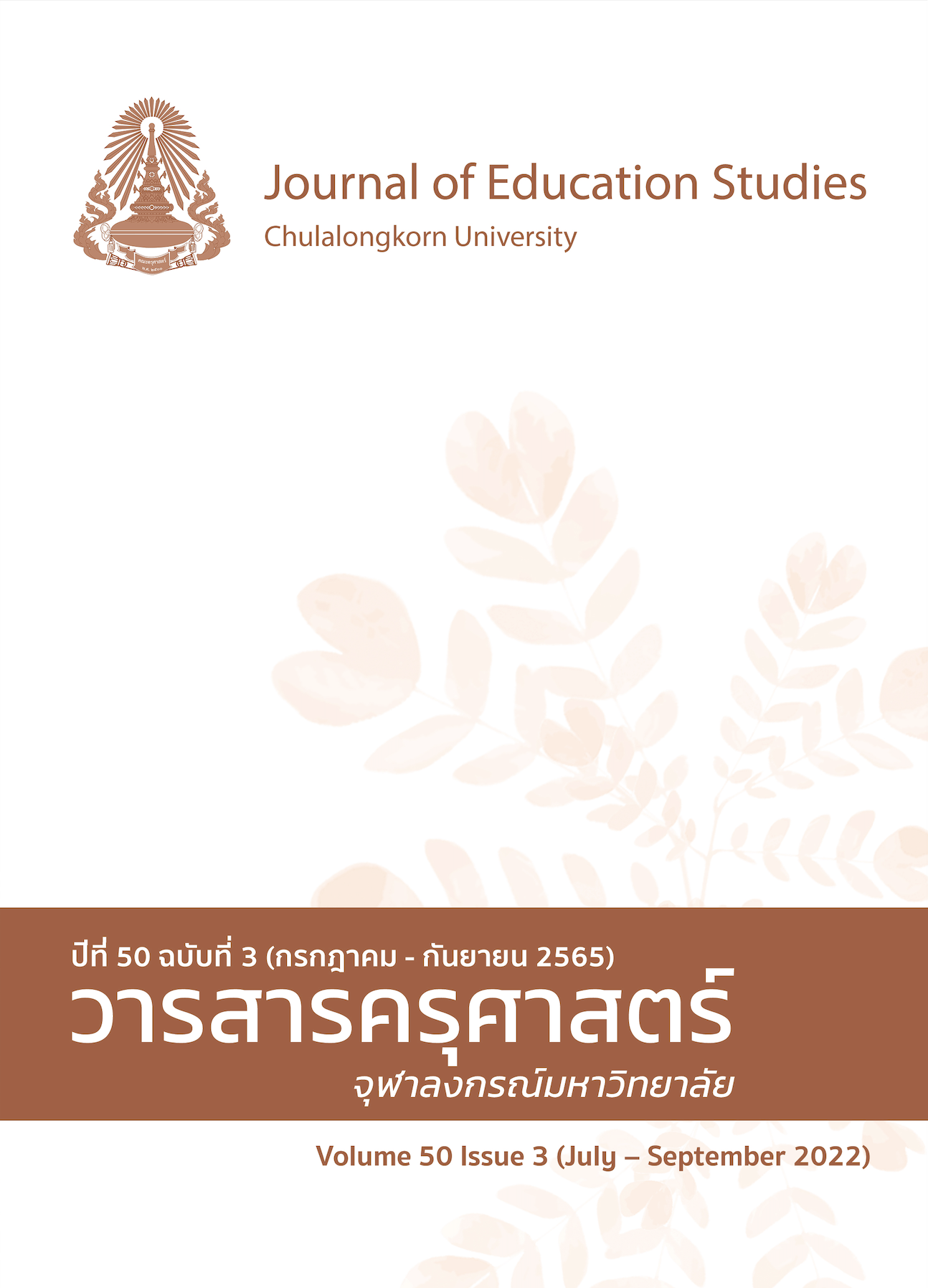Problems of Learning Management and Teachers’ Expectation Towards Administrators in the Situation of Coronavirus Disease 2019
DOI:
https://doi.org/10.14456/educu.2022.27Keywords:
learning management, administrators, the situation of Coronavirus disease 2019 (COVID-19) outbreakAbstract
The purposes of this research were 1) to study the teachers’ problems of learning management in the situation of the Coronavirus disease 2019 (COVID-19) outbreak; and 2) to study teachers’ expectations towards administrators in the situation of the Coronavirus disease (COVID-19) outbreak. The sample consisted of 20 Thai language teachers and social studies teachers from school in The Secondary Educational Service Area Office Bangkok 2 who received supervision chosen by purposive sampling. The study tools consisted of the questionnaires and semi-structured interview. The data was analyzed by mean, standard deviation and content analysis The results of this study revealed that 1) The teachers’ problems of learning management in the situation of the Coronavirus disease 2019 (COVID-19) outbreak were at a significant level. Problems related to students were the most serious. Problems of learning resources were the least serious. 2)Regarding teachers’ expectations towards administrators in the situation of the Coronavirus disease (COVID-19) outbreak, the administration which was expected from teachers consisted of 4 departments: Academic Department, Budgeting Department, Human Resources Department, and General Administration Department. The most expected was the Academic Department because it was directly related to teachers, students, and parents.
References
ภาษาไทย
กระทรวงศึกษาธิการ. (2551). หลักสูตรแกนกลางการศึกษาขั้นพื้นฐาน พุทธศักราช 2551. โรงพิมพ์ชุมนุมสหกรณ์การเกษตร.
จักรกฤษณ์ โพดาพล. (2563, 9 มิถุนายน). การจัดการเรียนรู้ออนไลน์ : วิถีที่เป็นไปทางการศึกษา. มหาวิทยาลัยมหามกุฏราช
วิทยาลัย วิทยาเขตศรีล้านช้าง. http://slc.mbu.ac.th/article/28181 file.pdf
ทิศนา แขมมณี. (2555). ศาสตร์การสอน : องค์ความรู้เพื่อการจัดกระบวนการเรียนรู้ที่มีประสิทธิภาพ (พิมพ์ครั้งที่ 6).
สำนักพิมพ์แห่งจุฬาลงกรณ์มหาวิทยาลัย.
ฐิติมา ชาลีกุล. (2564, 28 มกราคม). สพฐ. แจงเลือกวิธีเรียนได้หลายแบบหากไม่พร้อมเรียนออนไลน์. สำนักงานคณะกรรมการการศึกษาขั้นพื้น
ฐาน. https://www.obec.go.th/archives/377135
นรินธน์ นนทมาลย์. (2560). การพัฒนารูปแบบการออกแบบการสอนแบบเปิดด้วยวิธีการคิดอย่างเป็นระบบและกระบวนการ
กลุ่มโดยใช้วีดีโอเป็นฐาน เพื่อพัฒนาความสามารถในการแก้ปัญหาเชิงสร้างสรรค์ของผู้เรียนระดับอุดมศึกษา
[วิทยานิพนธ์ปริญญาดุษฎีบัณฑิต ไม่ได้ตีพิมพ์]. จุฬาลงกรณ์มหาวิทยาลัย.
นิตยา มณีวงศ์. (2564). ศึกษาพฤติกรรมและปัจจัยความสำเร็จการเรียนออนไลน์ แอปพลิเคชันไลน์ ในช่วงวิกฤต COVID-19. Journal of
Educational Studies, 15(1), 161-173. https://edujournal.bsru.ac.th/downloadfile/media/1770
วรากรณ์ สามโกเศศ. (2563, 20 มิถุนายน). 6 ปัจจัยเรียนออนไลน์ให้ได้ผลในมุมมองของ ดร.วรากรณ์ สามโกเศศ. กรุงเทพธุรกิจ.
https://www.bangkokbiznews.com/lifestyle/881331
วิทยา วาโย, อภิรดี เจริญนุกูล, ฉัตรสุดา กานกายันต์, และ จรรยา คนใหญ่. (2563). การเรียนการสอนแบบออนไลน์ภายใต้สถานการณ์แพร่
ระบาดของไวรัส COVID-19 : แนวคิดและการประยุกต์ใช้จัดการเรียนการสอน. วารสารศูนย์อนามัยที่ 9, 14(34), 285-298.
สำนักงานเลขาธิการสภาการศึกษา กระทรวงศึกษาธิการ. (2564). รายงานการศึกษารูปแบบการจัดการเรียนรู้สำหรับนักเรียน
ระดับการศึกษาขั้นพื้นฐานที่ได้รับผลกระทบจากสถานการณ์โควิด 19. สำนักงานเลขาธิการสภาการศึกษา.
ded70a0dee0
สุรชาติ อาจทรัพย์. (2558). ประสิทธิผลการเรียนการสอนผ่านสื่ออิเล็กทรอนิกส์ด้วยโปรแกรม Moodle สำหรับนักศึกษาชั้นปีที่ 2 วิทยาลัย
วิทยาศาสตร์และเทคโนโลยีการกีฬา (กรณีศึกษาวิชา วกกฬ 217 การนำเสนอสารสนเทศทางการกีฬา ปีการศึกษา 2556). Journal of
Professional Routine to Research. 2015(2). 81-89. https://so03.tci-thaijo.org/index.php/jpr2r/article/view/95809/74823
ภาษาอังกฤษ
Alibak, M., Talebi, H., & Neshatdoost, H. (2019). Development and validation of a test anxiety inventory for online learning
students. Journal of Educators Online 2019, 16(2), 5-12.
Anderson, T. (2008). The theory and practice of online learning (2nd ed.). Athabasca University Press.
April Giarla. (2016, February 24). The benefits of blended learning. https://www.teachthought.com/
technology/benefits-of-blended-learning
Du, X., Yang, J., Shelton, B., & Hung, J. L. (2019). Is learning anytime, anywhere a good strategy for success? Identifying
successful spatial-temporal patterns of on-the-job and full-time students. Information Discovery and Delivery, 47(4),
-181. https://www.emerald.com/insight/content/doi/10.1108/IDD-09-2019-0060/full/pdf
Febrianto, P. T., Mas' udah, S., & Megasari, L. A. (2020). Implementation of online learning during the Covid-19 pandemic
on Madura Island, Indonesia. International Journal of Learning, Teaching and Educational Research, 19(8), 233-254.
Downloads
Published
How to Cite
Issue
Section
License

This work is licensed under a Creative Commons Attribution-NonCommercial-NoDerivatives 4.0 International License.




